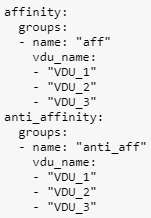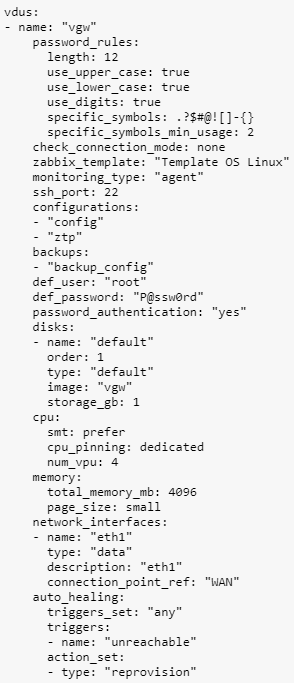flavours block
In the flavours block, you can specify the names of flavours by using the following parameter:
- name
For each flavour, you can specify the following parameters and blocks.
Value | Type | Description |
|---|---|---|
| Parameter | Brief description of the flavour. |
| Parameter | Sequential number of the flavour. The flavour with the lowest position has the lowest performance. |
| Block | Groups of VDUs that you want to be hosted on the same OpenStack host. We recommend hosting VDUs that require minimizing communication delays which each other on the same OpenStack host. |
| Block | Groups of VDUs that you want to be hosted on distinct OpenStack hosts. We recommend deploying VDUs that may require vertical scaling or high availability on distinct OpenStack hosts. |
| Block | Parameters of VDU administration consoles. |
| Block | VDU settings. |
All parameters and blocks are mandatory.
affinity and anti_affinity blocks
You can specify VDU groups using the following block:
groups
In this block, you can specify the names of VDU groups using the following parameter:
- name
For each VDU group, you can specify the VDU names using the following block:
vdu_name
Example of 'affinity' and 'anti_affinity' blocks
management block
In the management block, you can specify the following blocks:
vncParameters relevant to managing VDUs through the VNC console. You can specify VDU names using the following parameter:
- vdu_name
sshParameters relevant to managing VDUs through the SSH console. You can specify VDU names using the following parameter:
- vdu_name
For each VDU, you can specify the following parameters:
def_userName of the user on whose behalf the SSH session is to be established.
authenticationMethod for authenticating the VNFM in the virtual network function for running scripts. Possible values:
keymeans the VNFM is authenticated in the virtual network function using a key that is generated when the function is deployed. You need to get the key using a script. Scripts can be specified in theconfigurationsblock.passwordmeans the VNFM is authenticated in the virtual network function using a user name and password. The user name and password can be specified in thevdusblock.
All parameters are mandatory.
webParameters relevant to managing VDUs through the web console. You can specify VDU names using the following parameter:
- vdu_name
For each VDU, you can specify the following parameters:
protocolProtocol for connecting to the web console. Possible values:
httpandhttps.portPort for connecting to the web console. By default, port 80 is used. Range of values: 1 to 65,536.
pathPath to the web console.
def_userUser name for authenticating in the web console.
def_passwordPassword for authenticating in the web console.
All parameters are optional.
Example of a 'management' block
vdus block
In the vdus block, you can specify the names of VDUs using the following parameter:
- name
For each VDU, you can specify the following parameters and blocks:
Value | Type | Mandatory | Description |
|---|---|---|---|
| Block |
| VDU password requirements. You can specify the following parameters:
All parameters are optional. |
| Parameter |
| Type of VDU availability test performed during deployment. Possible values: |
| Parameter |
| Template for creating a host on Zabbix server corresponding to the virtual network function. |
| Parameter |
| Monitoring type of the virtual network function. Possible values:
|
| Parameter |
| Port number for establishing an SSH session. |
| Block |
| Names of scripts to be run on the VDU. Scripts can be specified in the |
| Block |
| Names of backup tasks to be used on the VDU. Backup tasks can be specified under |
| Parameter |
| User name for authenticating the VNFM in the virtual network function. |
| Parameter |
| Password for authenticating the VNFM in the virtual network function. |
| Parameter |
| Whether password authentication of the VNFM in the virtual network function is allowed. Possible values: |
| Block |
| Names of the VDU virtual disks. You can specify the names using the following parameter:
For each VDU disk, you can specify the following parameters:
|
| Block |
| VDU CPU parameters. You can specify the following parameters:
All parameters are mandatory. |
| Block |
| VDU RAM settings. You can specify the following parameters:
All parameters are mandatory. |
| Block |
| Network interface settings You can specify the names of network interface using the following parameter:
For each network interface, you can specify the following parameters:
If you need to specify the vNIC type of the network interface, you need to add the following block:
In this block, you can specify the vNIC type using the following parameter:
Possible values:
|
| Block |
| VDU auto-healing parameters. You can specify which external triggers must initiate VDU auto-healing using the following parameter:
Possible values:
You can specify which external triggers must trigger to initiate VDU auto-healing using the following block:
In this block, you can specify the names of external triggers using the following parameter: - Possible values:
You can specify the action that you want performed when an external trigger is triggered using the following block:
In this block, you can specify the action using the following parameter:
Possible values:
|
| Parameter |
| SSH availability timeout during VDU deployment, in seconds. If the VDU is not available over SSH after the specified timeout expires, the deployment is rolled back. |




